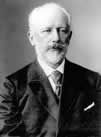Pyotr Ilyich Tchaikovsky
(1840-1893)
Although Tchaikovsky made outstanding contributions to the symphonic and operatic repertoires, the average music-lover knows Tchaikovsky for his ballets. Foremost among these are Sleeping Beauty, Swan Lake, and The Nutcracker, three of the most popular ballets of all time. Both Swan Lake and Sleeping Beauty, as well as part of The Nutcracker, were choreographed by Marius Petipa, who had studied ballet in his native France before emigrating to Russia. By uniting lyricism with technical difficulty, Tchaikovsky and Petipa transformed the world of classical dance.
Childhood and Early Years

Pyotr Ilyich Tchaikovsky was born on April 25, 1840 in Kamsko-Votkinsk, a small industrial town about 630 miles northeast of Moscow, in the Vyatka province of the Urals. He was the first of four children, his sister Aleksandra was two years his junior and his twin brothers, Anatoly and Modest were born in 1850.
His father, Il'ya Petrovich, held a position as a mine inspector, which allowed the family to live comfortably. His mother, Aleksandra, is not mentioned often by scholars, but it is known that her combined French and Russian heritage greatly influenced his educational and cultural upbringing. Thus, by the age of six he read in French and German, in addition to which he regularly received piano lessons from his nanny. Knowledge of Tchaikovsky’s childhood largely comes from this nanny, Fanny Dürbach, and from his brother Modest.
In 1848, Tchaikovsky’s father was forced to find new work, which took the family to Moscow and St. Petersburg. A year later they moved to the mining city of Alapayevsk, in the Urals. In 1850, several months after the birth of Tchaikovsky’s twin brothers, he was taken to St. Petersburg in order to enroll in the School of Jurisprudence, but he was too young to attend, so instead he went to a preparatory school for two years before being accepted at the former.
From 1852-1859, as a student at the School of Jurisprudence, he sang in the choir and composed a small amount of music. Ironically, most of his classmates did not consider him to be of any extraordinary talent and ultimately, upon his graduation, Tchaikovsky was placed in a position at the Ministry of Justice.
Conservatory Years
In the autumn of 1861, while working as a civil servant, Tchaikovsky began harmony studies under Nikolay Zaremba. At the same time he had decided it was crucial for him to continue his formal study of music and he applied to the newly opened St. Petersburg Conservatory. Among the first students to be admitted there, he studied composition primarily with Anton Rubinstein. In addition to composition, he studied flute, piano, and organ.
The most amazing aspect of his education at the conservatory was how quickly he progressed from writing student exercises to works that exibited a significant talent. Moreover, it was clear that his works reflected his own mixed ethnic background and a personal style, as opposed to the prevailing Russian national style.
Early Career
In September of 1865, Nikolay Rubinstein, the brother of Anton, came to St. Petersburg to recruit a theory teacher for the soon to open Moscow Conservatory. Anton Rubinstein recommended Tchaikovsky for the position. Eager to find work outside of civil service, Tchaikovsky accepted the post at the conservatory and in January of 1866 moved to Moscow where he lived with Nikolay for the following five years, teaching in the conservatory, and participating in cultural activities.
Tchaikovsky made some very significant friends while working in Moscow. First and foremost was Nikolay Rubinstein, who was a prominent figure in the Moscow music scene. Through Nikolay, Tchaikovsky was introduced to the publisher Pyotr Jürgenson, who became his principal publisher and source of steady income. Nikolay Kashkin was another notable figure with whom Tchaikovsky became friends; he was a music critic and one of his staunchest supporters.
In Moscow Tchaikovsky enjoyed success. By 1866 he had completed his Symphony in G minor and by 1868 he had completed the opera The Voyevoda. He was a social celebrity and lived a lavish lifestyle slightly beyond his means.
In an 1868 visit to St. Petersburg, he spent time with members of The Five. He played his symphony for them from the manuscript, which they thought was “Russian” enough to pass their standards, but they still regarded him with some suspicion. As Rimsky-Korsakov noted “Our former opinion of him changed to a more favorable one, though this conservatory education still placed a considerable barrier between him and us.” Tchaikovsky likewise held The Five in dubious regard. In a letter written some ten years later he stated “…all of the newest Petersburg composers are very gifted persons, but they are all afflicted to the marrow with the worst sort of conceit and with a purely dilettantish confidence in their superiority over all the rest of the musical world.” He did, however, have high regard for Rimsky-Korsakov.
However, his personal life during this period was not as successful as his professional one. Tchaikovsky’s intimate relations throughout his lifetime are difficult to verify, but it is generally accepted that he was gay. It is from his letters to his brother Modest that we can infer that he experienced no unbearable guilt over his sexual orientation, but did take the negative social implications seriously. It was particularly important to him that he did not impact his family with any potential scandal. Despite his preference for male companionship, he seriously courted the diva, Désirée Artôt, who was performing in Moscow in 1868. Initially Artôt was interested, but she ended up marrying his rival, another singer from the opera company, which left Tchaikovsky heartbroken.
Marriage and Patronage
Two significant events took place in 1877, one was a failed attempt at marriage and the other was gaining financial independence through a wealthy benefactor. A student of his, Antonina Ivanovna Miliukova declared her love for Tchaikovsky and, for several reasons, he agreed to marry her. This union was his attempt to adhere to social conventions, but it should also be noted that Antonina was soon going to receive an inheritance, and since he was prone to outspending his income, this possibility of financial gain could also have been a factor. Unfortunately, however, after two weeks of marriage, he found himself to be incompatible with Antonina and his situation to be unbearable. Fearing his wife would drive him insane, he fled to his sister’s estate in the Ukraine.
A short time later, he returned to his wife in Moscow, but fell ill within ten days. His brother Modest, concerned about his deteriorating health, took him away to St. Petersburg where Tchaikovsky soon had a nervous breakdown. The marriage was a disaster and they separated after only nine weeks, but he continued to support her for the rest of his life. In 1896, three years after Tchaikovsky’s death, Antonina was placed in an insane asylum and that was where she lived out the remainder of her days.
The upheaval of his marriage brought about the second significant event in 1877. That year he stopped teaching at the conservatory. He was able to do so due to a regular allowance he had started receiving from an extremely wealthy widow, Nadezhda von Meck, who had a very intense connection to his music. Initially, she had heard about his financial difficulties through a mutual friend and arranged to commission a few works at very high fees. These initial commissions evolved into her offering regular assistance. This arrangement allowed Tchaikovsky to live well and devote his time solely to composition.
The two of them had a very peculiar agreement: she would continue to send him money provided they never met in person. What followed was fourteen years of correspondence. The 1,200 letters exchanged between the two of them illustrate the many aspects of Tchaikovsky’s personality: his neuroses, his own critical assessments of his music, and his daily musings on life. They kept to their agreement and even though both were occasionally at the same place at the same time, they avoided all contact. He received her financial support until 1890, when one day he received an abrupt letter from her canceling the arrangement and severing all communications. Tchaikovsky was hurt by the loss of his long-time confident, but by that time he was earning enough to live without her assistance.
Tchaikovsky spent the winter of 1877 in Clarens, France and finished two important works, the Fourth Symphony and the opera Yevgeny Onegin. This period also marked the beginning of a six year period that he passed traveling throughout his homeland and Europe. Little by little Tchaikovsky was slowly garnering fame outside of Russia. After hearing a concert in 1874, the famous conductor Hans von Bülow began championing his music, premiering the First Piano Concerto in Boston in 1875 and conducting its German premiere in 1879. Another well-known conductor, Hans Richter, also led his orchestral fantansy Romeo and Juliet in Vienna.
By 1881, after traveling around Europe for a number of years, Tchaikovsky began to assess where he was headed with his career. He realized it was time to go home to Russia, to actually have a place to live, and to take a position that offered stability. Returning to Moscow, he became the director of the Moscow chapter of the Russian Music Society when his close friend and mentor Nikolay Rubinstein died, a circumstance which brought him back into the fold of the conservatory (though he no longer taught). He also began conducting performances, mostly of his own music, but also occasional performances of Mozart and Beethoven, among others.
Final Years
While his career continued to grow, his health was failing through much of 1886-1887. Believing that the end was near, he drafted his will and prepared for the inevitable. But it turned out that it was not his time. Instead, he continued to write music in his last years, staying very busy and in 1888, was awarded a lifetime pension for his work from Tsar Aleksandr III. His last work, Symphony No. 6 (Pathetique), premiered a week before his death. Now regarded as one of his best pieces, it unfortunately received a rather icy reception at the premiere.
Tchaikovsky died on October 25, 1893. The circumstances of his death are still a topic of debate. The original report was that Tchaikovsky unknowingly drank unboiled water and contracted cholera. Another theory is that he rather arrogantly drank unboiled water expecting to be impervious to it. Still a further conjecture put forth by some recent scholarship is that he committed suicide by arsenic poisoning, this being the respectable solution to avoid a scandal for engaging in a relationship with a nephew of the Tsar. Though the last theory makes for exciting reading, it is nearly impossible to substantiate with the surviving evidence.
References:
Baker, Theodore. The Concise Baker’s Biographical Dictionary of Musicians. 8th ed.Rev. Nicolas Slonimsky. New York: Schirmer Books, 1994.
Goulding, Philip. Classical Music: The 50 Greatest Composers and Their 1,000 Greatest Works. New York: Fawcett Books, 1992.
Schonberg, Harold. The Lives of the Great Composers. 3rd ed. Rev. Nicolas Slonimsky. New York: W.W. Norton &Company, 1997.
Wiley, Roland John. ‘Tchaikovsky, Pyotr Il'yich’, Grove Music Online ed. L. Macy (Accessed 13 January 2006), <http:www.grovemusic.com> |



